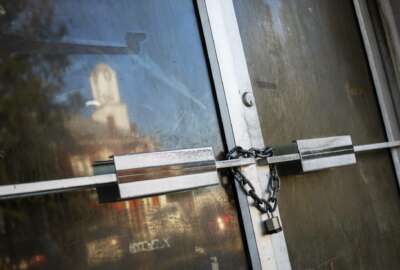To listen to the Federal Newscast on your phone or mobile device, subscribe in PodcastOne or Apple Podcasts. The best listening experience on desktop can be found using Chrome, Firefox or Safari.
- Like everywhere else, the Department of Veterans Affairs is battling its own COVID-19 surge across the country. VA hospitals are tracking nearly 14,000 active cases among veterans and others, including almost 1,200 COVID cases among employees. A total of 172 VA employees have died due to complications from COVID-19, including 26 employees this month alone. VA said that’s the highest number of COVID-related employee deaths in a month since the pandemic began.
- The General Services Administration didn’t always take appropriate steps to limit exposure to COVID-19 in federal buildings, according to its inspector general. In a review of 33 positive COVID cases, the IG said GSA’s Public Buildings Service didn’t give contractors the correct scope of work to conduct detailed cleaning and disinfection services. This marks the third report GSA’s IG has issued raising concerns over the agency’s response to the pandemic. GSA said it’s responded to more than 15,000 COVID-19 incidents across hundreds of federal buildings and thousands of leased properties.
- GSA is giving the federal workforce new teleworking options. GSA is awarding a first of its kind contract to WeWork and four other pre-approved contractors to provide flexible workspaces for federal employees. The federal government is the nation’s largest occupier of office space, and did not have an established coworking acquisition vehicle until this award. GSA recently announced it would allow federal employees to telework out if its headquarters in an effort to reduce the federal real estate footprint.
- Leaders within the Administrative Office of U.S. Courts have voiced their opposition to a new bipartisan bill, which would grant federal judiciary workers the same whistleblower protections and antidiscrimination rights as federal employees. In a letter to the House Judiciary Committee, Roslynn Mauskopf, director of the office, said the bill fails to recognize the robust safeguards already in place within the Judiciary to protect its employees.
- The Defense Department is continuing to realign its space bureaucracy. Officials have begun sketching out the transition of the Space Development Agency from the office of the under secretary of defense for research and engineering to the Space Force. The fledgling SDA is working to deploy a new National Defense Space Architecture. The constellation will one day consist of hundreds of satellites for tracking missiles, providing positioning data and facilitating communications. The agency is expected to continue that work while it completes the shift to the Space Force by October 2022.
- The Pentagon’s move to zero trust security is gaining more traction. The Defense Department will establish a zero trust portfolio management office this fall, DoD Chief Information Officer John Sherman announced at a FedTalks conference this week. The new office will be overseen by David McKeown, the DoD chief information security officer within Sherman’s organization. He said the move to a zero trust architecture is intended to shift the advantage away from cyber attackers by assuming they’re already on DoD’s network. The strategy relies on a range of technologies and methods, including new identity, credential and access management solutions.
- The Drug Enforcement Administration is moving quickly to undertake a major review of its overseas operations after a critical inspector general report. The IG found the DEA’s headquarters-based management and oversight of agency-supported foreign law enforcement units were insufficient and increased risks to all parties. Administrator Anne Milgram ordered a top-to-bottom review of its 91 foreign operations that will be overseen by an independent team. The review will make recommendations to increase the integrity and accountability of DEA’s international operations.
- The Veterans Benefits Administration’s GI bill modernization effort is underway. VBA rolled out new text messaging features for veterans using the GI bill. It’s also building a new online portal for students and schools. VA said the goal is to automate up to 80% of the GI benefits process, so the agency can process a claim in five days or less and reduce the potential for mistakes. The department has a 10-year managed service contract to modernize GI benefits. But veterans will see most of the customer-facing updates within the next year and a half.
- A major federal supply chain risk management initiative reaches the end of the beginning. The process to remove a technology product or exclude a company because of supply chain risks is final. The Federal Acquisition Security Council issued its long-awaited final rule yesterday with minimal changes to the interim rule issued last September. The FASC received comments from six entities and made only technical and structural changes to simplify or clarify the processes. The 44-page rule outlines how the FASC will share supply chain risk information with other agencies and the public. It also details the processes by which the FASC will make removal and exclusion recommendations to DoD, the Department of Homeland Security, and the Office of the Director of National Intelligence.
- The Treasury Department’s Bureau of the Fiscal Service is setting short-term goals to improve financial management over the next few years. Commissioner Tim Gribben, in a letter to agency chief financial officers, says the bureau will migrate 70 of its datasets off legacy formats by 2024. Gribben says the shared financial management systems will help the federal government save more than $600 million by 2023.
- She may strut her cute self back and forth in Las Vegas, but she’s a serious federal law enforcement officer. The golden retriever known as Alona has been voted the cutest canine of the Transportation Security Administration. Alona won out over a field of 77 smart and good-looking dogs put forth for the public to vote on, edging out two German Shephards and a Belgian Malinois. Alona works as a sniffer-outer of bombs and explosives at McCarran International Airport and is one of a thousand canines employed by TSA.
Copyright
© 2025 Federal News Network. All rights reserved. This website is not intended for users located within the European Economic Area.




